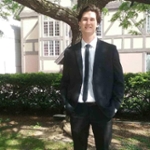Winners Announced in the Latest HWC Poetry Contest

To celebrate National Poetry Month in April, the Howe Writing Center sponsored a poetry contest on the theme What We Leave Behind: Sustainability and Disposability. The contest was planned and facilitated by the consultant-led Creative Writing Special Interest Group (SIG).
When we planned this contest, we could not have forseen the added resonance the theme would take on due to the coronavirus pandemic. As a Miami community, we've had to leave campus life behind and adapt to a new, often challenging, situation. What will we carry with us through this time? What will we throw away? How will we continue to adapt? Poetry can help us approach these big questions.
We're grateful to all who submitted their work. Members of the Creative Writing SIG collaborated in the judging process. After careful deliberation, we’re now happy to share the winning poets and their writing. First-prize winner, and recipient of a $100 Amazon Gift Card, is Alexander Benedict. Runner-up, and recipient of a $50 Amazon Gift Card, is Brianna Porter. An Honorable Mention, and $10 Chipotle Gift Card, goes to Hannah Stohry. Read their poems and author bios below!
First Prize: Alexander Benedict
Read Alexander's poems "anthem for uneaten candycanes" and "American Doll"
anthem for uneaten candycanes
cardinal burps moon.
grass teaches water to speak.
if you cannot recognize
the boundaries between fantasy
and reality, please, contact Gary
Gygax at 888-8888.
Dhalsim carved a hole in Mr. Fantastic's
throat with a candycane.
praise Hydrogen, hallelujah!
concrete digests sunshine,
producing paper-bag melodrama.
after time expanded, Grandma
stuffed stars with dryer lint.
android-blood smells
distinctly like pine tar.
Heat Miser (Mr. Green Christmas) melts
the moon in his clutch; reportedly,
his lungs resemble purple corn chips.
hello there, Mr. Dog Man!
how many gingerbread
men did you decapitate today?
America's posterity represents
a wide variety of corn derivatives.
American Doll
an empty Red
Bull can inside
a Pringle's cylinder
Inside a plastic Forever
21 bag inside a Chinese
takeout cardboard box
inside the passenger
seat of my Hyundai Elantra
In the Writer's Words:
For "anthem for uneaten candycanes": "When we discuss sustainability and disposability, it’s easy to comment on things such as taking shorter showers, using cold water when washing clothes, opening the darn windows instead of using air conditioning, or unplugging the TV if you aren’t using it; however, I don’t often hear people discuss limiting our consumption during holidays such as Christmas. Currently, I still have eight candycanes in the sock drawer of my dresser. In this poem, I reference the dominance of monoculture, corn products in the food industry and the melodrama of suburban life in a snowless December. When monoculture crops such as corn “corner” the market, soil nutrients suffer, creating the need for synthetic fertilizers, which, consequently, leak into nearby water supplies. In the documentary King Corn, Ian Cheney and Curt Ellis discover that their bodies, and nearly all Americans, are >50% carbon derived from corn products."
For "American Doll": "I wrote this poem last summer after road-tripping from Houston, Texas to Rochester, New York. When my girlfriend and I made it to Ontario (a small town pressed up against Lake Ontario, 20 minutes North of Rochester), I tried to pack the trash we had accumulated as efficiently as possible. The concept of fitting each piece of trash into each other reminded me of Russian dolls, a set of hollow dolls that reveal a smaller doll tucked within. Although I don’t think this poem says anything grand about U.S. consumerism, I enjoyed lineating the process of packing trash into itself; each piece of consumer culture gradually reveals itself across the edges of lines and over the gaps of stanzas, creating a similar cubist effect to Williams’ The Red Wheelbarrow.
 Alexander Benedict is an English Literature & Creative Writing double-major at Miami University. His poetry has previously appeared or is forthcoming in Inklings, The Oakland Arts Review, and Happy Captive. In collaboration with Perth Machine Learning Group, he co-authored Machine Poetry Collection for the 2018 Fringe Festival. Currently, he moderates the online writing community r/OCPoetry and writes daily, spontaneous flarf on @FlarfVanity. He wears his Grandfather’s watch unwinded, hands pointing to 10 o’clock.
Alexander Benedict is an English Literature & Creative Writing double-major at Miami University. His poetry has previously appeared or is forthcoming in Inklings, The Oakland Arts Review, and Happy Captive. In collaboration with Perth Machine Learning Group, he co-authored Machine Poetry Collection for the 2018 Fringe Festival. Currently, he moderates the online writing community r/OCPoetry and writes daily, spontaneous flarf on @FlarfVanity. He wears his Grandfather’s watch unwinded, hands pointing to 10 o’clock.
Runner-Up: Brianna Porter
Read Brianna's poem "They Told Me The World Was Dying"
They Told Me The World Was Dying
they told me the world was dying
and I believed them
I made an effort to recycle after lunch
I turned the water off while I brushed my teeth
I did everything within my eight-year-old power to help
they told me the world was dying
and I believed them
I saw the science to back it up
I believed my family of five could make a difference
I tried to convince my parents that Global Warming could be
stopped
they told me the world was dying
and I believed them
except it wasn't my fault
but the discovery of fossil fuels and deforestation and factories.
my chest got tight as
they told me the world was dying
and I couldn't save it
but they pretended they could with their
#Activism and #SaveTheTurtles
and the God damn plastic straw crusade
the world is dying
and Starbucks is now using plastic lids with their plastic cups
and someone tried to make me drink water through pasta
and the fucking Amazon caught on fire
and no one did anything because they cared more about Notre
Dame burning down
the world is dying
and I believe them
but what am I supposed to do about it?
because our recycling is thrown out with the trash
and if I think too hard about it my heart races as my mind
spirals
the world is dying
and I can't do anything
but reflexively recycle,
keep a small army of plants alive,
and pray the people who can make a difference care as much as
I do
In the Writer's Words:
"To start this piece, I just wrote the generalized prompt at the start of the page and started brainstorming about sustainability and disposability. I wrote things like, "recycle out of habit," "laugh at straw frenzy," and "reusable Starbucks cup, but they said screw that." Then I left it for a day and came back the next night with a phrase that had been echoing in my head since I woke up: "They told me the world was dying and I believed them." So that was the glue of my poem, so to speak. As I wrote, I was mostly purging my thoughts on climate change and everything I thought I could do versus what I can actually do. So it follows that emotional path, from hope in my youth to practicality to disbelief at the actions of others to panic, and finally, to resolution. After I wrote it a couple times, I spoke it out loud, to make sure it flowed the way I wanted, and then I was finished. Like most things, climate change is one of the things I have strong feelings about but don't dwell on because then I can't stop thinking about the impossibility of it. This was the release of those feelings that will hopefully leave me feeling better in the future."
 Brianna Porter Brianna Porter is a creative and professional writing double major and will be a senior in the fall of the 2020-21 school year. She is involved with the Office of Institutional Relations, Mosaic Magazine, and The Miami Student. After graduating, she hopes she'll have a solid enough job until she can write something about pirates.
Brianna Porter Brianna Porter is a creative and professional writing double major and will be a senior in the fall of the 2020-21 school year. She is involved with the Office of Institutional Relations, Mosaic Magazine, and The Miami Student. After graduating, she hopes she'll have a solid enough job until she can write something about pirates.
Honorable Mention: Hannah Stohry
Read Hannah's poem "The Sorting Process"
The Sorting Process
--scanning--scanning--scanning--scanning--
--beep--beep---beep--beep---
Notice, identify, label, categorize, value
Measure, decide, assign, sort.
This goes here, this goes there.
--BEEP--BEEP--BEEP--BEEP--
*does not compute*
*does not compute*
*does not compute*
Not identified.
Not identified.
Not identified.
--toss--
--scanning--scanning--scanning--scanning--
--beep--beep---beep--beep---
Notice, identify, label, categorize, value
Measure, decide, assign, sort.
This goes here, this goes there...
Wait, what happened? Why did it get tossed?
--That one is sorted with all the other unsortables
--For the greater good
--It wasn't sustainable. It had to be disposed.
You created it, though!
--scanning--scanning--scanning--scanning--
--It should never be created again.
Wait, why are you scanning me?
Not identified
Is it because I questioned the system?
Not identified.
WAIT!
Not identified.
--BEEP--BEEP--BEEP--BEEP--
*toss*
In the Writer's Words:
"The purpose and intent with this submission was for me to creatively explore how to talk about mixed race identities, and to think about sustainability and disposability of humanity based on race/ethnicity. I will be using critical autoethnography as a methodology for my eventual dissertation research and wanted a creative challenge. Although I am also not a poet, I wanted to play with that creativity without the pressure of methodology to think through embodied mixed race experiences. I think that I kept it ambiguous enough (intentional) so that the reader may assume I am referring to the recycling/trash sorting process, but I'm also playing with the idea of humanity and the social stratifiers with rigid eligibility criteria, and the clinically whitened ease in which we throw out people who do not conform to those criteria. Like people with mixed identities, and all other marginalized populations. We also don't question the criterion for which recyclable materials are constructed as being recycled. We blindly trust that our sustainability efforts actually have the effect for which we are aiming. We must question. We must educate ourselves. Being creative and trying to figure out ways in which to use writing to encourage people to question epistemologies (ways of knowing) is so fun. I write because I must, and I write because I hope it will have an impact."
 Hannah Stohry is a clinically licensed social worker and is completing her third-year as a Ph.D student in Educational Leadership (Leadership, Culture, and Curriculum program) at Miami University in Oxford, Ohio. She is currently employed as a Graduate Assistant at the Mindfulness & Contemplative Inquiry Center. Hannah’s global multicultural life experiences influence her current research curiosities (in no particular order): mixed race studies, MultiCrit, critical whiteness studies, Third Culture Kids, borders theories, Asian theology and feminism, radical love, contemplative inquiry, vulnerability, and critical autoethnography as methodology. Hannah does this work for and with others who live on and across the constructed margins, linking together as a formal resistance against these constructed margins to create a more socially just future for all.
Hannah Stohry is a clinically licensed social worker and is completing her third-year as a Ph.D student in Educational Leadership (Leadership, Culture, and Curriculum program) at Miami University in Oxford, Ohio. She is currently employed as a Graduate Assistant at the Mindfulness & Contemplative Inquiry Center. Hannah’s global multicultural life experiences influence her current research curiosities (in no particular order): mixed race studies, MultiCrit, critical whiteness studies, Third Culture Kids, borders theories, Asian theology and feminism, radical love, contemplative inquiry, vulnerability, and critical autoethnography as methodology. Hannah does this work for and with others who live on and across the constructed margins, linking together as a formal resistance against these constructed margins to create a more socially just future for all.

